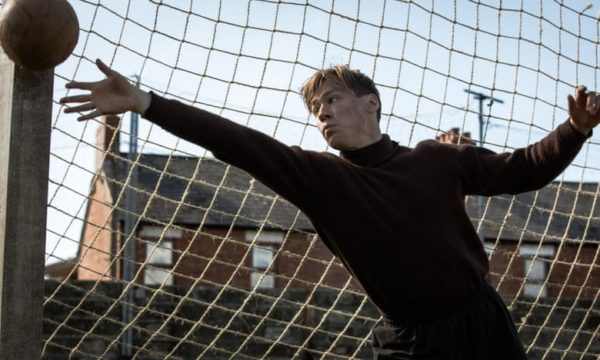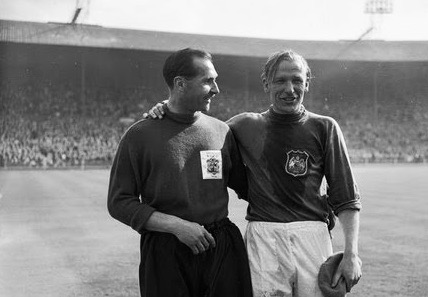Marcus Rosenmuller’s absorbing drama, The Keeper, based on a real story, is framed by two related scenes early in the movie — a dance party in the British town of St. Helen’s interrupted by a German air raid in 1944, and a group of German soldiers captured on home ground by Allied forces in 1945.
These events fade into the drabness of a prisoner-of-war camp in Britain, near St. Helen’s, where German troops are housed. One of them, Bert Trautmann (David Kross), attracts the attention of Jack Friar (Jack Henshaw), a local grocer who supplies the camp with food. Friar, the coach of a soccer team, is impressed by Trautmann’s skills as a goal tender. During a pickup game, Trautmann deflects every ball fired at him. Clearly, he’s a superior player.
A keen judge of talent, Friar persuades Trautmann to join his team. He grudgingly accepts the offer because he would rather play soccer than clean toilets. As part of his duties outside the camp, he works in Friar’s shop in exchange for cigarettes.

At first, there is resistance to his presence. The wounds of the war have yet to heal. People in St. Helen’s still refer to Germans as “Krauts” and the “enemy.” Friar’s feisty daughter, Margaret (Freya Mavor), is equally antagonistic to Germans. Addressing Trautmann, she hurls an accusatory remark, “I know what you really are.”
He protests. “I didn’t have a choice,” he says, implying he was conscripted into the German army, like every able-bodied male. In fact, Trautmann served in the German Air Force and was then a paratrooper on the eastern front and in Western Europe, winning the Iron Cross medal for valor.
Trautmann seems to be a decent fellow. Unlike some of his comrades in the camp, he is not a hard-core National Socialist addicted to “Nazi discipline.” In an attempt to “re-educate” the Germans in captivity, the British screen a graphic documentary film about the crimes against humanity committed by their countrymen in the Bergen-Belsen concentration camp. Some of the clips, particularly those of naked corpses being piled into trenches by bulldozers, are horrific.
As expected, Trautmann performs brilliantly as a goalkeeper, vindicating Friar’s trust in him. When the POW camp closes, he continues working for him. With the passage of time, they bond, forming a friendly relationship. He and Margaret are also drawn to each other, arousing the anger of her jealous British boyfriend.

In 1949, Trautmann turns professional when Manchester United hires him. It’s a controversial decision because anti-German feeling is still running strong in the city. At a press conference, a journalist poses a sensitive question: how will Manchester’s large Jewish community react to Trautmann? Once again, he reiterates he was simply carrying out his duties. But when he casually mentions he won the Iron Cross, he gives the impression he may have been more than just a dutiful soldier.
Demonstrations break out, and on the field Trautmann is booed by some fans. The tension is defused by Rabbi Alexander Altmann, who lost his family in the Holocaust. In a letter to a local newspaper, he urges people to judge Trautmann on his merits.
The film reaches its climax during the 1956 Cup Final, the British soccer championship, at Wembley stadium in London. Badly injured in the last 17 minutes of the game, Trautmann plays on courageously, the intense pain notwithstanding, earning the respect and admiration of the immense crowd.
Kross, a German actor, brings strength, dignity and even charisma to his role. The rest of the cast delivers fine performances as well. The Keeper, which is currently playing in Washington, D.C., leaves the universal message that Rabbi Altmann tried to convey: judge people on the strength of their character rather than their nationality.
